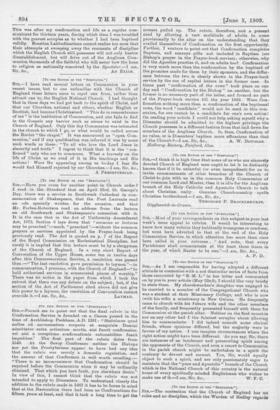[To TRH EDITOR or THR "SPECTATOR:] Si,—Have you room for
another point in Church order P I read in the Standard that on April 23rd, St. George's Day, there was a service in Southwark Cathedral in com- memoration of Shakespeare, that the Poet Laureate read an ode specially written for the occasion, and that Mr. Forbes-Robertson read an address from the lectern on old Southwark and Shakespeare's connexion with it. It is the case that in the Act of Uniformity Amendment Act, 1872, Section 6 lays down that "sermons or lectures may be preached "—mark, "preached "—without the common prayers or services appointed by the Prayer-book being previously read. The Act is quoted on p. 7 of the Report of the Royal Commission on Ecclesiastical Discipline, but surely it is implied that this lecture must be by a clergyman of the Church of England. hi a very short Report of Convocation of the Upper House, some ten or twelve days after this Commemoration Service, a resolution was passed thus :—" The last resolution gave permission to laymen "—in communication, I presume, with the Church of England—" to hold authorised services in consecrated places of worship." There was no notice in the paper from which I took the extract that there was any debate on the subject ; but, if the section of the Act of Parliament cited above did not give this power to a layman, the resolution of Convocation cannot










































 Previous page
Previous page